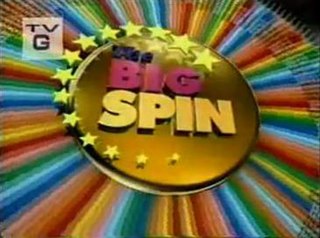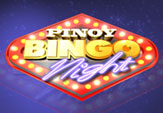
In the United States and Canada, bingo is a game of chance in which each player matches the numbers printed in different arrangements on cards. The game host draws balls at random, marking the selected numbers with tiles. When a player finds that the selected numbers are arranged on their card in a horizontal, vertical, or diagonal line, they call out "Bingo!" to alert all participants to a winning card, which prompts the game host to examine the card for verification of the win. Players compete against one another to be the first to have a winning arrangement for the prize or jackpot. After a winner is declared, the players clear their number cards of the tiles and the game host begins a new round of play.

Card Sharks is an American television game show. It was created by Chester Feldman for Mark Goodson-Bill Todman Productions. The game features two contestants who attempt to predict the outcome of survey questions to gain control of a row of oversized playing cards, then determine whether the next card drawn is higher or lower. The title Card Sharks is a play on the term "card sharp", a person skilled at card games.

Lingo is an American television game show with multiple international adaptations. In it, contestants compete to decode five-letter words given the first letter, similarly to Jotto, with each correctly guessed word earning number draws to attempt filling in a Bingo card.
Concentration is an American television game show based on the children's memory game of the same name. It was created by Jack Barry and Dan Enright. The show featured contestants matching prizes represented by spaces on a game board, which would then reveal portions of a rebus puzzle underneath for the contestants to solve.
Buena Fortuna was a popular but short-lived Argentine television game show hosted by Julián Weich.
Lingo is a Canadian game show that ran for 439 episodes on Télévision de Radio-Canada across Canada, from 1998 to 2001. It was hosted by longtime actor and radio/TV host Paul Houde. The show's format combined the structure of the game of chance known as bingo with a word guessing game; contestants took turns guessing five-letter words and tried to guess enough of them to fill in enough spaces on a five-by-five card to form a line.

The New Zealand Lotteries Commission, trading as Lotto New Zealand since 2013, is a Crown entity that operates nationwide lotteries in New Zealand. It was established in 1987 and operates under the Gambling Act 2003. Its oldest and most popular game is Lotto, which boasts a top prize pool of NZ$4 million. Other games include the four-draws-daily Keno, the daily Bullseye, and a variety of scratchcards and online games known as Instant Kiwi. Instant Kiwi may only be played by persons 18 years of age or older, under the Gambling Act 2003. Powerball and Lotto Strike are optional extras with every Lotto ticket.

The Big Spin is the California Lottery's first television game show.
Lucky Numbers was a weekly Bingo-based game show that aired on ITV from 9 January 1995 to 4 July 1997 and was hosted by Shane Richie.
National Bingo Night is an American game show hosted by Ed Sanders which premiered on ABC on May 18, 2007, with a six-episode order. Sanders is known for his work on another ABC show, Extreme Makeover: Home Edition. The show was cancelled by ABC and was repackaged as Bingo America on GSN, first hosted by Patrick Duffy, and in October 2008 by Richard Karn.

Avago was a gaming television channel in the United Kingdom and Ireland. It was launched on 4 July 2002.

Bingo America is an American game show broadcast by Game Show Network. The series follows two contestants as they try to compete to win up to $100,000. Additionally, the series lets at-home viewers print bingo cards online that allow them to play along with the show to win small amounts of money for themselves.
Lingo is a British game show based on the American programme of the same name, the original iteration of the programme was made by Thames Television and Action Time for ITV, running for a single series with host Martin Daniels from 12 May to 14 July 1988. A revived version has also aired from 1 January 2021 hosted by Adil Ray.

Bingo Night Live is an interactive television programme featuring a free-to-play bingo game, broadcast in the United Kingdom on ITV. It aired between 4 June 2008 and 29 November 2008.

Pinoy Bingo Night is the Philippine game show version of National Bingo Night, which premiered on the ABS-CBN from March 30 to June 26, 2009. It is hosted by Kris Aquino with Brod Pete as the "bingo caller" and Mel Feliciano as the "commissioner", who referees the playing studio audience.

Lingo is a television game show that aired in the Netherlands between 1989 and 2014, and returned in 2019 on the commercial channel SBS6. Since 2022, it is aired on the commercial channel Net5. The format consists of a word game that combines Mastermind and Bingo.
National Bingo Night is an Indian game show, based on the American game show of the same name, produced by Urban Brew Studios which schedule to premiere on Colors TV on 23 January 2010. The show is hosted by Indian actor Abhishek Bachchan. The first celebrity guest on the show was Amitabh Bachchan, the father of the show's host.
Family Game Night is an American television game show based on Hasbro's family of board games and EA's video game franchise of the same name. The show was hosted by Todd Newton. Burton Richardson was the announcer for the first two seasons; he was replaced by Stacey J. Aswad in the third season, and Andrew Kishino was hired for the fourth season. The 60-minute program debuted on October 10, 2010, on The Hub ; it was previewed on October 9, 2010, on its sister channel, TLC. Seasons 1 and 2 contained 26 and 30 episodes respectively. Seasons 3, 4 and 5 each contained 15 episodes. Season 2 premiered on Friday, September 2, 2011, with additional games being added. The games added to the second season included Cranium Brain Breaks, Green Scream, Ratuki Go-Round, Simon Flash, Operation Sam Dunk, Trouble Pop Quiz, and Spelling Bee. However games from the previous season were still kept.
The Biggest Game in Town was a British quiz show that aired on ITV between 10 September and 21 December 2001. The programme was broadcast live and was based on the game of bingo. It was presented by Steve Le Fevre.










